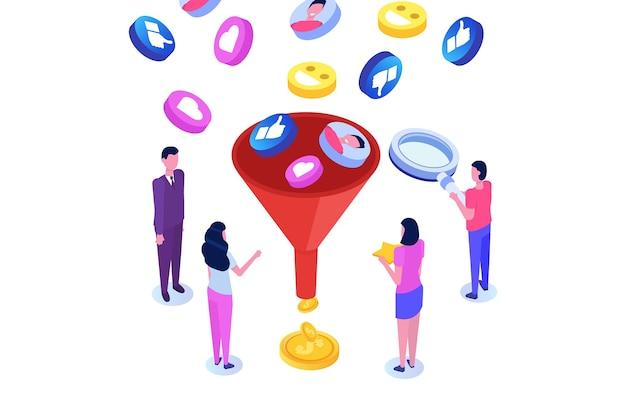Are you looking to improve your business through effective digital marketing? One of the most crucial aspects of any digital marketing strategy is to generate more leads. But what exactly are marketing leads, and why are they so important?
Marketing leads refer to individuals or businesses who have expressed interest in your product or service. These leads can be obtained through various channels such as email marketing, social media, SEO, and more.
The more leads you have, the higher your chances of converting them into paying customers. As a result, businesses must ensure that they have a steady flow of leads to propel their growth and revenue.
In today’s digital age, generating marketing leads has become more accessible than ever before. With the right strategies and tools, you can capture quality leads that are more likely to convert into loyal customers.
But how exactly do you generate leads in digital marketing? In this comprehensive guide, we will delve into the world of marketing leads and explore different strategies for procuring them. So buckle up and get ready to enhance your digital marketing game with our ultimate guide to procure marketing leads.
What Does It Mean to Procure Marketing Leads
Procuring marketing leads refers to the process of acquiring potential customers interested in your products or services. In other words, it is a method of creating a lead database that can potentially turn into a sale. It can be done in various ways, including online and offline marketing strategies, such as digital ads, email marketing, social media, networking events, and many more.
The Importance of Procuring Marketing Leads
Procuring marketing leads is crucial in driving your business’s growth and success. Without leads, there is no one to sell to, which means no revenue to generate. Therefore, having a reliable lead database enables you to have a steady influx of potential customers and improved sales. Not only that, but procuring marketing leads also allows you to build a relationship with your audience, which can turn your one-time customers into loyal ones that keep coming back for more.
Common Methods of Procuring Marketing Leads
- Email Marketing: One of the easiest and most common ways to procure marketing leads is through email marketing. By creating compelling emails with relevant content, you can get people interested in your product or service to sign up for your email list.
- Social Media: Social media platforms are another popular method to procure marketing leads. LinkedIn, Twitter, Facebook, and Instagram are great platforms to engage with potential customers and create a buzz for your products or services.
- Content Marketing: Content marketing is an effective way to procure marketing leads by creating valuable content that educates, informs, or entertains your audience. This will help you attract and retain a clearly defined audience and ultimately drive profitable customer action.
- Networking Events: Attending networking events is another way to procure marketing leads. It’s an opportunity to meet potential customers, interact with them, and create a relationship that could lead to a sale.
Procuring marketing leads is a fundamental aspect of any business, and it requires a consistent effort to build and maintain a reliable lead database. By utilizing various online and offline marketing strategies, you can optimize your procurement of marketing leads and enhance your business’s growth and success. Remember, procuring marketing leads is not a one-time effort; it requires ongoing nurturing and engagement with your audience.
What are Marketing Leads
Marketing leads are potential customers who have shown some interest in your product or service and are likely to become paying customers. These are individuals or businesses that have provided contact information such as email, phone number, or social media handle, and have given consent to receive marketing communication from your brand.
Different Types of Marketing Leads
There are different types of marketing leads, and understanding them can help you target your potential customers better:
-
Warm Leads: these are individuals who have already shown some level of interest in your brand and are more likely to convert into paying customers. These could be people who have signed up for your newsletter, filled out a contact form on your website, or attended an event hosted by your brand.
-
Cold Leads: these are potential customers who have little to no knowledge of your brand. They might have stumbled upon your website out of curiosity or through a search engine. It’s important to nurture them with personalized, informative content to convert them into warm leads.
-
Qualified Leads: these are warm leads who have gone through a vetting process, and their interests match what your brand has to offer. They have a higher probability of converting into paying customers, and personalized communication with them can increase conversion rates.
Why are Marketing Leads Important
Marketing leads are the backbone of any business, and without them, businesses cannot thrive. Here are some reasons why marketing leads are important:
-
Increased Sales: More marketing leads means more potential customers, which can lead to increased sales and revenue for your business.
-
Better Targeting: Understanding your lead’s interests, pain points, and needs can help you tailor your marketing messages and strategies better, resulting in a higher success rate.
-
Brand Awareness: Marketing leads, even if they don’t convert into paying customers, can be a valuable source of promotion for your brand by sharing your content or recommending your brand to others.
In conclusion, marketing leads are a crucial aspect of any marketing strategy. Understanding the types of leads and their importance can help businesses create effective marketing campaigns and attract potential customers.
What Does More Leads Mean
If you’re in the business of marketing, “more leads” might seem like a no-brainer — it means growth, more potential revenue, and an increased customer base. But what does that really look like?
The Numbers Game
For many marketers, generating a high number of leads can feel like a victory in itself. But what really counts is the quality of those leads. It’s better to have a smaller number of high-quality leads than a ton of low-quality ones that won’t convert to customers.
More Opportunities for Sales
More leads means more opportunities for sales, but it’s important not to be too pushy or sales-focused in your approach. Nurture and educate your leads, build relationships, and show them the value of your product or service.
Better ROI
If you focus on generating high-quality leads and nurturing those relationships, you’ll see a better return on investment (ROI) than if you just focus on the quantity of leads. By cultivating relationships and providing value to your leads, you’ll be able to convert more of them into loyal customers.
Increased Brand Awareness
More leads can also mean increased brand awareness, especially if those leads come in through referrals or word-of-mouth. By providing exceptional customer experiences and delivering on your promises, you’ll build a positive reputation that can lead to even more leads down the road.
In conclusion, more leads can mean a lot of different things for your business. But by focusing on generating high-quality leads, nurturing relationships, and providing exceptional experiences, you can turn those leads into loyal customers and drive growth for your brand.
What is a Lead in Digital Marketing
In the world of digital marketing, a lead is a person or organization that has shown interest in your company’s products or services. Leads can come in many forms, such as website visitors, social media followers, or people who have filled out a form on your website.
Types of Leads
There are two main types of leads: marketing-qualified leads (MQLs) and sales-qualified leads (SQLs). MQLs are people who have shown interest in your company’s products or services but are not yet ready to make a purchase. SQLs, on the other hand, are prospects who have been vetted by your sales team and are deemed ready to make a purchase.
How Leads are Generated
Leads are generated through various marketing efforts, such as email marketing, content marketing, and social media marketing. These efforts aim to attract potential customers and encourage them to engage with your brand. Once a lead is generated, it is the job of your sales team to nurture and convert them into paying customers.
Why Leads are Important
Leads are the lifeblood of any business. Without leads, there would be no potential customers to sell to. By generating leads and nurturing them, businesses can grow their customer base and increase their revenue. Leads also provide valuable insights into the effectiveness of your marketing efforts, allowing you to make data-driven decisions about your marketing strategy.
In conclusion, a lead is a person or organization that has shown interest in your company’s products or services. Leads are generated through various marketing efforts, and they are the lifeblood of any business. By understanding what a lead is and how they are generated, businesses can grow their customer base and increase their revenue.
How do I Generate leads in digital marketing
Digital marketing has become an essential part of every business’s marketing strategy. With the rise of technology, the way of generating leads has also changed. Now, businesses can reach their potential customers online. Here are some ways to generate leads in digital marketing:
Optimize Your Website:
The website is the first point of contact with the customers. Thus, it should provide a good user experience, be easy to navigate, and load fast. Besides that, it should also be optimized for search engines. Optimize your website by targeting specific keywords related to your business. This will help your website to rank higher in search engines, attracting more organic traffic to your website.
Use Social Media:
Social media is a platform that can help you connect with your potential customers. With billions of people active on social media, you can use it to promote your business, engage with your audience, and generate leads. By consistently producing and promoting quality content on your social media pages, you can increase your brand’s visibility and attract more followers. You can also run ads on social media platforms to reach out to more people.
Use Email Marketing:
Email marketing is one of the most effective ways to generate leads. You can send emails to your subscribers promoting your business and services. However, it is essential not to spam your subscribers and send relevant content only. You can also segment your email list and send personalized emails to your subscribers, increasing the chances of conversion.
Produce Quality Content:
Quality content attracts visitors to your website, and in turn, generates leads. Create and publish informative blog posts, videos, and infographics related to your business. Optimize your content for search engines, and share it on social media platforms to generate traffic. Quality content will help you establish your brand’s authority, create a following, and engage with your audience.
Run Paid Ad Campaigns:
Digital marketing offers various paid advertising options, including Google Ads, Facebook Ads, and LinkedIn Ads. You can target specific keywords, locations, demographics, and interests to reach out to your potential customers. Running paid ad campaigns will help you generate leads quickly and increase your business’s visibility.
Conclusion:
Digital marketing offers endless opportunities to generate leads. By optimizing your website, using social media, email marketing, producing quality content, and running paid ad campaigns, you can attract potential customers and grow your business. The key to successful lead generation is to be consistent, creative, and authentic. Remember that every business is unique, and you need to find the strategies that work best for your business.



